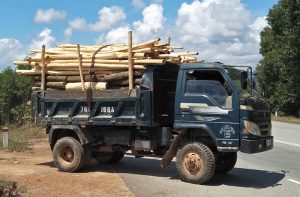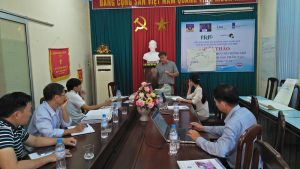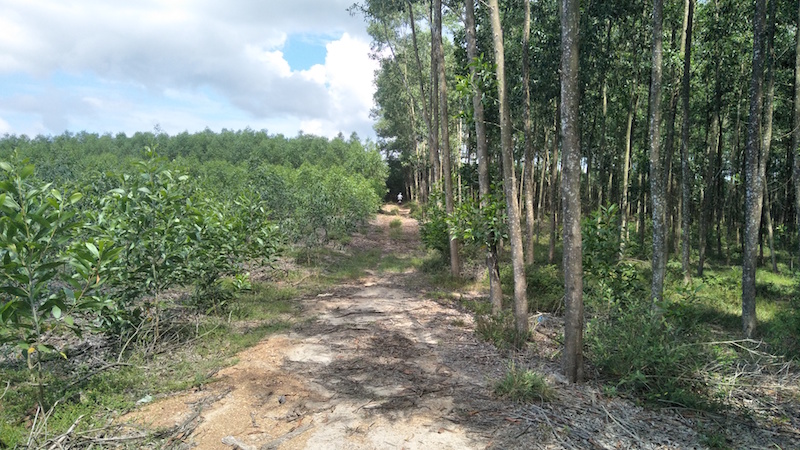Vietnam is a country in south-east Asia with a population of about 95 million people and a land area equivalent to 40% that of NSW or 140% that of Victoria. Its population consists of many ethnic groups, including for example the Austronesian highlanders, including the Giarai, Ede, Garlai and Churu,
In a land where the natural forest has previously been severely impacted by the effects of wars, all the country’s natural forests are now protected. In fact, according to Dr Ha from the Centre for Climate Change Study in Central Vietnam [CCCSC] at Hue, there is also a national plan to restore 10,000 hectares of mangrove forest that is aimed to counter adverse climatic extreme impacts on aquaculture.
Hence, the country has turned to plantations as the model for growing forest products. At a recent workshop the Director/President of Vietnam Academy of Forestry Sciences [VAFS] provided figures that the plantation scale is 4.2 million hectares growing at 230,000 new hectares per year. The majority of the plantation is Acacia species. There has been a long involvement of Australian assistance with this, notably from CSISO and ACIAR.
The forest products sector has been growing in recent years and is important to the national economy. For example, forest products export value in billion USD was 2.0 in 2006, 6.8 in 2016 and already 8.0 before end of 2018. However, there is still a need to import wood, with it currently being about 4.9 million m3 equating to 1.7 billion USD.
 Image above: Truck used with load of logs. These trucks are so much smaller than here!
Image above: Truck used with load of logs. These trucks are so much smaller than here!
One major challenge for the forest sector is that much of the plantation estate comprises small areas owned by farmers that are dispersed. In fact the average holding is 1-2 hectares across 300 cooperatives nationally. To these owners, cash flow and access to credit are very important.
A second challenge is that Vietnam is a country with a “high-risk” rating in terms of corruption Perception Index [CPI]. You may ask, “Why this is a challenge?” The answer lies in the reality that having a high CPI combined with no national forest certification scheme means that forest products are not as readily accepted on the international trade market. Hence, there is increasing pressure on small landholders to have a proven, independently verified, and internationally- recognised certification of their forest products. Without this in the medium to long-term these small landholders face the prospect of being locked out of markets. This would derive them of income from the trees that is so very vital to shifting them further away from poverty.
It response to such challenges, PEFC International [Programme for Endorsement of Forest Certification] initiated a pilot project with the Vietnamese Cooperative Alliance, providing technical and hands on guidance to implement a Chain of Custody Due Diligence System. A successful outcome would mean that even though the forests themselves may not be certified, the various member Cooperatives could sell all their tree products as a certified “Controlled Source”. This term means that it reaches an acceptable legality threshold for timber trade, thereby enabling many small “actors” to have confidence that all their hard work in establishing and maintaining their crop will not go unrewarded when time comes in 4-8 years to harvest and sell their trees.
Mr Richard Laity, a young Australian Forester based in Laos with PEFC International, has been championing this project. At Richard’s invitation, Dr Wayne Tibbits from Tasmania volunteered to travel to Vietnam in September in order to join him and many local stakeholders in order to assist the project at a critical stage in its progress. Global-Mark has accreditation for PEFC recognised Forest Management and Chain of Custody, and through this Wayne has completed about 250 audits, two-thirds of these being Chain of Custody.
“We had a ‘full on ‘10 days” recounted Wayne. “This was not a matter of PEFC imposing their model on the Vietnamese, but rather of working closely with and assisting several key stakeholders so that the country achieves the profound benefits that a successful outcome would produce.”
Meetings, consultations and workshops were held with VAFS, the Bureau of Accreditation [BoA], Vietnam Cooperative Alliance [VCA], Ministry of Agriculture and Rural Development and VN Forests in Hanoi. These were high-level meetings, with the Director General of VN Forests, President of VCA, and Heads of BoA and VAFS. The role of these stakeholders is explained:

Image above: Cooperative Alliance Hue meeting
- VAFS was coordinating development of the national Forest Management and Chain of Custody standards, including public consultation.
- BoA is our equivalent of JAS-ANZ, has over 1,000 CABs and everything is in place to assess CABs for accreditation to PEFC endorsed standards.
- VCA’s role is to set up cooperatives amongst the 53 Cooperative Alliances, having human and financial resources to enable setting up wood product value chain and a Steering Committee for CoC implementation in Cooperatives.
- VN Forests has the people directly responsible for overseeing Sustainable Forest management [SFM] in Vietnam. A new law passed in 2017 has reference to organisations required to develop plans for SFM. It becomes effective in 2019. They are responsible to get Prime Minister approval for a National Governing Body [NGB] framework for PEFC standards.
At a more ‘grass roots’ level, several days were spent in Hue, where the pilot project is based. Dr Ha of CCCSC at Hue University had a small team working on the Chain of Custody system manual and supporting components. The Cooperative Alliance Hue, which reports to VCA, is a key stakeholder that is developing software to manage paperwork administration with a smart device App for wood sales by smallholders. Opportunity was made to visit plantation trials, a representative small manufacturing enterprise [SME] and the Phú Bai Cooperative [Hue] plant nursery.
It was encouraging to see that all were open to receiving assistance for the goal to obtain certification covering due diligence assessment of holders growing trees in the cooperatives. “Everyone was so appreciative of the assistance that Richard and I were offering”, said Wayne.
Our input there culminated in a Workshop on, “Enhancing small holder forestry towards sustainable and profitable forest management in Vietnam”. This was sponsored by Food and Forest Fund, Food and Agriculture Organisation of the United Nations, and Forest and Farm Facility. Many prominent Vietnamese and international speakers addressed key issues of relevance to the project, whilst panel and group discussions teased out relevant matters. As the Ambassador of Finland remarked, small landholders can play role as “catalyst of inclusive growth”.
Since that Workshop, there have been advances in the project, with the Government appointment of the VN Forests as the NGB and VAFS as a consultant to project implementation.
It is wonderful to know that Global-Mark, through its accredited Chain of Custody programme working with its clients, has developed competence in its audit team that has been able to assist the people of Vietnam. Watch this space as future opportunity may present itself for other projects in south-east Asia.

Dr Wayne Tibbits CF
Forestry Programme Manager


